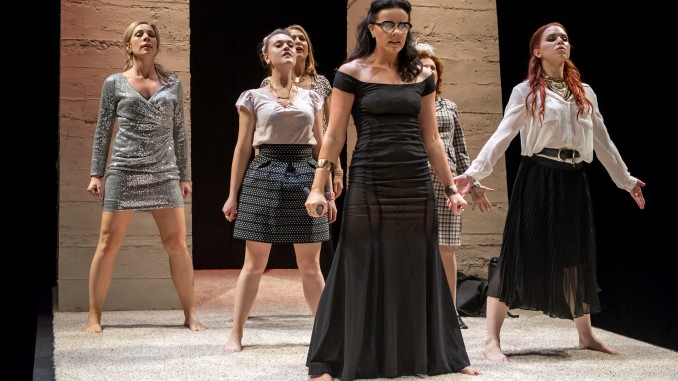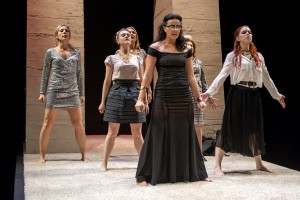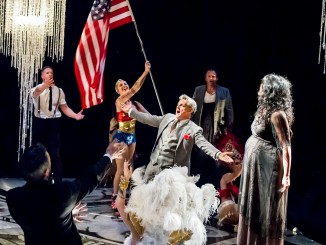
Make love… and theatre… not war [by Matt Baker]

The serendipity of coming across the fourth entry in this Cracked article today was not lost on me. Aristophanes wrote Lysistrata over 2,400 years ago and, according to the opening night audience, dick jokes are just as funny now as they were then, and if there is one person in New Zealand to not only direct, but adapt, such comedy for the 21st century, it is the ever humorous Michael Hurst. Staying true to the original text, Hurst does not hold back on any of the stereotypical attributes Aristophanes placed on either gender. The women gabble and gossip, Amanda Billing’s titular character being the sole motivator of their cause, while the men’s excessive egotism wanes in direct opposition to their erections.
Direct opposition is also incorporated in Rachel Walker’s traverse set, which, even when sitting predominantly at one end, is not difficult to watch. Traversing said set, the 13-strong ensemble work in excellent cohesion with one another, with Jennifer Ward-Lealand and Naomi Cohen in particular providing an individual flair without detracting from the play. Cameron Rhodes is so perfectly cast he could submit his performance as an Auckland mayoral bid, while Peter Hayden gives a hilarious turn as a gruff, cigarette-smoking, Dr. Strangelove-esque wheelchair-bound misogynist.
It must be noted that Lisa Greenfield, who plays the hilariously named Spartan slave, Doris, has been incorporated into the production due to injury, and, while Lucinda Hare’s absence from the more physically demanding choreography is notable, the solution has a foundation of genuine theatrical convention to support it. Hare herself steals the show with an Austrian-influenced accent and brutally open directness that extrapolates the humour of even the simplest one-liners.
Prolific Lysistrata translator Douglas Parker attests that the “fundamental relationship is not about blind sexual gratification… but love in its civic manifestation – the bond between husband and wife”. In this production, both propositions have been incorporated, personified particularly well in both their sentimental and comedic extremes with Darien Takle and Hayden, and Sia Trokenhim and Fasitua Amosa respectively. However, the dichotomy between the sexual theme and the political message of the text does not play on the same spectrum. While not inherently problematic, as both Billing and Rhodes orate with a fervent intellectual and emotional capacity, the noticeably polemic shift in the playwright’s voice lacks comparative subtlety. There is an argument to be had as to whether this is a problem in the original text or the direction, but, either way, the play is a comedy and the comedy in this production is its strength.
With a play this absurd and heightened in both its genre and artistic heritage, Hurst stamps the production with his signature comedic and highly stylised direction. This stylisation is best illustrated in his employment of John Gibson and Shona McCullagh’s music and choreography respectively, which provides what is quite simply an outstanding spectacle component to the show, ranging from the chaotic to the heartfelt.
What Hurst has presented, within the confines of a black box theatre, is the closest theatrical experience one can have to that of the play’s original audience. Without encouraging hecklers, it’s the sort of show that requires an active and engaged audience, one to whom the actors can respond, and generate the symbiotic relationship that exists between performers and spectators. Both Billing and Rhodes, again, exemplify this as they address the audience, responding to the odd supportive interjection from the audience.
It is moments like these that remind us of the communal nature of theatre, the sharing of ideas through entertainment, that sits at the heart of Hurst’s production, and while the “ruinous conflict” at heart of the play has yet to find its place within the production’s dramatic exchange, there is no doubting that the theatrical value of Lysistrata will be of thorough entertainment to all audiences.
Lysistrata is presented by Auckland Theatre Company and plays until August 26. For details see ATC.
SEE ALSO: Theatreview.org.nz review by Lexi Matheson and Metro Magazine review by James Wenley




Leave a Reply